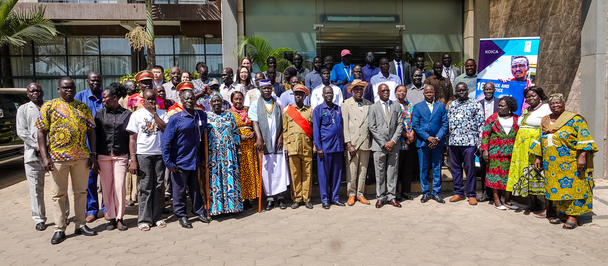UNDP assists the Government of the Kyrgyz Republic in the institutional renewal of Peace Infrastructure at the sub-national level
April 29, 2024

Osh, 26 April 2024 – Today in the city of Osh there is a discussion of the draft Regulations on Public Consultative Councils on Interethnic Relations (PCCs), aimed at institutional reform of existing PCCs on interethnic issues. PCCs are an integral part of the existing Peace Infrastructure, a national early warning system for conflicts at the district and local levels.
The event was attended by representatives of the Administration of the President of the Kyrgyz Republic, the Ministry of Culture, Information, Sports and Youth Policy of the Kyrgyz Republic, the State Agency for Civil Service and Local Government under the Cabinet of Ministers of the Kyrgyz Republic, the State Commission for Religious Affairs of the Kyrgyz Republic, local authorities and self-government, civil society organizations, such as women's councils, youth committees, elders' courts, activists, religious representatives, public prevention centers and others.
In April 2013, the Government of the Kyrgyz Republic adopted the Concept of strengthening the interethnic relations and unity for 2013-2017 years. To implement this concept, Public Consultative Councils on Interethnic Relations (PCCs) were created in 23 multi-ethnic districts and one State Public Advisory Interethnic Council under the State Agency for Local Self-Government and Interethnic Relations.
“The PCC’s were built at the local level as one of the elements of the conflict early warning system in 2014. Now, in the face of new challenges and the need for integration, it is the time to consolidate the Regulations and formalize and unify the work,” emphasized Zamir Tursunbekov, Chief Expert of the Department of Policy Development for Monitoring and Analysis of Reforms of the President’s Administration of the Kyrgyz Republic.
In recent years, the Kyrgyz Republic has adopted several strategic documents aimed at strengthening the unity of the people, such as the “Concept on development of civil identity “Kyrgyz Zharany” for 2021–2026”, "State policy in the religious sphere for 2022-2026", “State programme on countering extremism and terrorism for 2023–2027”, "Concept on youth development 2020-2030", “National Action plan on UN Resolution 1325 (Women, peace and security)” and others.
Therefore, there is an urgent need for institutional reform of existing PCCs from interethnic issues towards comprehensive civil integration. Reforming the PCCs has also become relevant considering the provisions of the current Constitution, adopted in 2021, as well as the existing structure of executive and local authorities.
The United Nations Development Programme (UNDP) is committed to ensure integrating best governance practices to ensure good governance and social cohesion.
“The UN Development Programme in Kyrgyzstan is assisting the Government of the Kyrgyz Republic in promoting an integrated approach that ties together conflict prevention, social cohesion and peacebuilding. Today’s public discussion of the project of the PCCs’ Regulations is another step in supporting the building of more effective, transparent, and accountable institutions. They help strengthen the national early warning system for conflicts at the district and local levels,” said Alexandra Solovieva, UNDP Resident Representative in Kyrgyzstan.
This event was supported by the UNDP project «Strengthening National Capacities for Conflict Prevention and Peacebuilding: Meaningful Civil Society Engagement for Trust -building Trust and Social Cohesion» funded by the UN Peacebuilding Fund.
***
For media inquiries please refer to Ainagul Abdrakhmanova, UNDP Communications Officer, at Ainagul.abdrakhmanova@undp.org

 Locations
Locations









